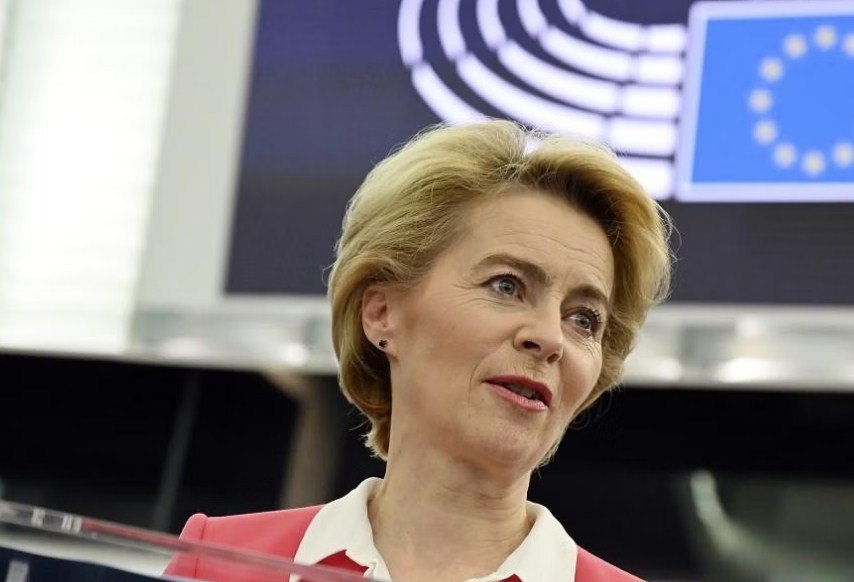European Commission President Ursula von der Leyen delivered her annual State of the European Union speech on Wednesday, highlighting the bloc’s achievements and challenges in the face of the COVID-19 pandemic, the climate crisis and the geopolitical tensions. She also hinted at her ambition to seek a second term in office in 2024, as she focused on the economic opportunities of the European Green Deal and announced a probe into Chinese subsidies for electric vehicles.
A geopolitical union
Von der Leyen began her speech by praising the EU’s response to the global health emergency, which included securing enough vaccines for its 450 million citizens and donating over 700 million doses to low- and middle-income countries. She also expressed solidarity with Ukraine, which has been facing a full-scale invasion by Russia since 2021, and pledged to increase the EU’s humanitarian and development aid to the war-torn country.
She said that the EU had shown its ability to act as a “geopolitical union” that can defend its values and interests on the world stage. She cited the bloc’s leadership in the fight against climate change, its support for democracy and human rights in Belarus, Afghanistan and Ethiopia, and its efforts to revive the Iran nuclear deal and foster dialogue with Turkey.
She also called for a stronger strategic partnership with the United States, especially on trade, technology and security issues. She welcomed the recent announcement of a new alliance between the US, Australia and the UK to counter China’s influence in the Indo-Pacific region, but stressed that the EU should also develop its own vision and strategy for the area.
A green economy
The main theme of von der Leyen’s speech was the economic potential of the European Green Deal, which aims to make the bloc climate neutral by 2050. She said that the EU had already adopted landmark legislation to reduce its greenhouse gas emissions by at least 55% by 2030, compared to 1990 levels, and to increase its share of renewable energy sources and energy efficiency.
She said that these targets were not only necessary to prevent catastrophic global warming, but also an opportunity to create new jobs, boost innovation and enhance competitiveness. She pointed out that the EU was already a global leader in clean technologies such as wind turbines, batteries and electric vehicles, and that it had a clear ambition to make its future industry “made in Europe”.
To achieve this goal, she announced that the EU would launch an investigation into Chinese subsidies for electric cars, which she said were flooding the global market with artificially low prices. She also said that the EU would propose a new law to ensure that all products sold in its single market comply with its environmental and social standards, creating a level playing field for European businesses.
She also announced that the EU would invest €4 billion ($4.7 billion) in Africa’s green transition, supporting projects such as renewable energy, sustainable agriculture and circular economy. She said that this was part of the EU’s commitment to help developing countries cope with the impacts of climate change and achieve their own emission reduction goals.
A second term?
Von der Leyen’s speech was widely seen as an attempt to showcase her achievements and vision for the future of Europe, ahead of the bloc-wide elections and the changeover of the commission’s top brass in 2024. The German conservative did not explicitly mention her intention to run for a second term as commission president, but she gave several hints that she may be interested in staying on until 2029.
She repeatedly referred to her program for a “green, digital and geopolitical Europe” that she presented in 2019, when she was nominated by the European Council and narrowly confirmed by the European Parliament. She also stressed that she had delivered on most of her promises despite facing unprecedented challenges such as the pandemic and the war in Ukraine.
She also tried to appeal to different political groups in the parliament, which will have a decisive role in electing the next commission president. She praised the role of social partners and civil society in shaping the EU’s recovery plan, which will provide €750 billion ($880 billion) for public investment and reforms. She also defended her proposal for a new tax on digital giants, which is supported by most left-wing and green parties.
However, she also faced some criticism from some MEPs, who accused her of lacking ambition on climate action, human rights and democracy. They urged her to increase the EU’s emission reduction target to 60% by 2030, impose sanctions on authoritarian regimes such as China and Russia, and trigger legal action against member states that violate the rule of law, such as Hungary and Poland.

